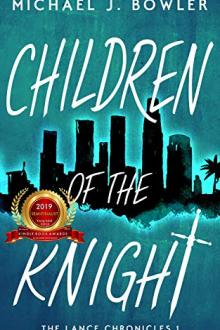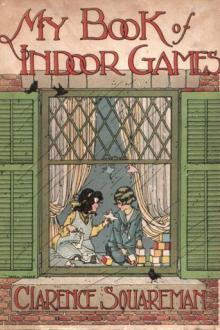Children of the Knight - Michael J. Bowler (best books to read non fiction .txt) 📗

- Author: Michael J. Bowler
- Performer: -
Book online «Children of the Knight - Michael J. Bowler (best books to read non fiction .txt) 📗». Author Michael J. Bowler
“We’ll find him, Jack. I promise.”
Jack’s handsome face dissolved into a mosaic of twisted pain, and Lance quickly pulled him off the sidewalk and into a small hollow between buildings so they wouldn’t be as likely to be noticed.
“Mark feels worthless, Lance,” Jack stammered, almost choking on the words. “He said so in his letter. You saw it. I love him so much, and he doesn’t even know that!” His eyes pooled with shimmering anguish, and Lance’s own heart seemed to pull into his throat. “Why couldn’t he see it in my eyes like you did?”
Lance shook his head, struggling with his own fears and haunted by his past. He hadn’t been a loner his whole life just to avoid his conflicted feelings and all their complications. No, he’d always felt deep down that he wasn’t worthy of anyone’s love. Not him. He wasn’t that special. He was just… well, nothing. The nothingness he’d fueled his entire life now rose within him and took on the massive proportions of a Greek god straight out of Olympus, except now that god wore Mark’s soft, delicate, and ever-so-sad features.
And suddenly Lance understood.
Mark had felt the exact same way, and that’s why he ran. He didn’t believe he should be loved, just like Lance didn’t believe it about himself. But Mark did deserve love—oh my God, did he ever! He’d accepted Lance with all his screwed-up history and contorting emotions and uncertain sexuality, and had kept his secret when he could’ve used it against him. But Lance had never told him, had never told the other boy he loved him. That he was worthy of love.
Jack wasn’t the only one standing in that alley with guilt painted on his face in permanent ink.
Lance gently placed his hands on Jack’s thick upper arms. “Mark couldn’t see it, Jacky, ’cause he didn’t think he was worthy,” he said almost in a whisper. “I guess we can only see the love we think we’re good enough to have, and he didn’t think he was good enough to have any.”
Tears of remorse cut little pathways of pain along Jack’s cheeks to pool at the edges of his lips before dropping to the ground at his feet. He nodded, comprehension rising like the sun, enlightening his face with the truth.
Lance wrapped his arms around Jack’s shoulders and held him tightly, letting their individual pain and guilt melt together like chunks of ice dissolving into each other beneath a hot summer sun.
Finally, they separated, wiping their faces dry with the sleeves of their tunics.
Lance managed to pull up that angelic smile that seemed to have charmed the whole world, and he let it fall upon Jack like sunlight. “We’ll find him, Jack, and we’ll both tell him how much we love him.”
Jack nodded and offered a crooked, rakish little grin.
Lance turned to look at the sidewalk. Several people had stopped to gawk, but hurried away when they saw he had noticed them.
Whatever!
Then he spotted a pizza-by-the-slice place on the boulevard across from their location. “C’mon, Jack, we need to eat.”
He pointed to the pizza place, and Jack reluctantly nodded.
Outside City Hall, with the Mural Project underway across the street, Mayor Villagrana had called a press conference. He and the council had decided to challenge Arthur and the public who supported him on a very crucial subject: school. It was now mid-October, and Arthur’s kids were still not attending school on a daily basis. In fact, hundreds of other middle and high school students continued ditching their own classes to join him on the daily clean-up campaigns.
The Los Angeles School Board was furious with Villagrana for not saying something sooner—since school had officially begun in August—and had berated him publicly for aiding and abetting the king by having those “Mural Kids” continue skipping school to do the painting. This controversy was exactly what the mayor had been waiting for. The cracks in the king’s armor were beginning to expand, and Villagrana was determined to split them wide open.
Since Helen Schaeffer seemed to be Arthur’s chosen Lois Lane, as he’d heard her called, the mayor made certain to invite her, but all the local media were also present. Villagrana made sure the cameras caught the out-of-school mural workers clearly behind him as he addressed the reporters. He felt grand and in charge, wearing his best designer suit and affecting his most concerned look.
“Thank you all for coming down here today on such short notice,” he began. “Welcome, Helen, Phil,” he said, pointing to some of the regulars. Helen scowled. “As you can all see, the city’s mural project is moving along, and we hope to have an unveiling soon. These kids have been working nonstop, and they won’t even let me see the work in progress. Is that gratitude or what?”
He flashed a smile.
“However, we have a problem. My office has been flooded with calls—not true, but these fools don’t know that—from parents of kids who’ve been skipping school to join Arthur’s little parade. And the school boards of Los Angeles and surrounding cities are understandably upset because the schools are showing an increasingly high absentee rate. As you know, every school receives ADA money from the state based on average daily attendance, and Arthur has upward of a thousand kids out there who are not attending school on a consistent basis.”
He failed to mention that most of them weren’t attending before they’d joined up with Arthur, but that was a minor detail the press didn’t need to know.
“And while I admit a certain gratitude to Arthur for what he’s done in some of our less fortunate parts of town, the fact is, in clear violation of the law, Arthur’s kids are ditching school.”
One reporter shot up a hand.
“Yes, Jane?”
“Mr. Mayor, aren’t you doing the same thing by hiring these children to paint your mural, rather than attend school?”
The mayor affected his most pained expression. He wanted to look as guilty as possible, though he’d secretly hoped someone would bring that up. “Exactly my point, Jane. Like you and everyone else in our fair city, I’d gotten so caught up in what this amazing man has been doing that I, too, forgot our priorities. Yes, of course these kids behind me should be in school. And starting tomorrow, that’s exactly where they’ll be. No work on the mural will be allowed until after 3:00 p.m. I’m only calling on Arthur to do the same.”
Now Helen raised her hand, and Villagrana reluctantly pointed to her, flashing his most welcoming smile. “Yes, Helen?”
“But isn’t what Arthur’s kids are doing just as important, or more so, than school? Even the kids working on the mural? Aren’t they learning more valuable lessons doing what they’re doing than they would in a classroom?”
“You may well be right, Helen. But may I remind you that it is the law for children to be in school until the age of eighteen.”
“And who voted for that law, Mr. Mayor, the children or the adults?”
Now Villagrana gritted his teeth, visibly annoyed.
Leave it to that woman to screw everything up!
“I’m not here to debate the semantics of our legal system, Helen. The law is the law.”
“But weren’t you a strong supporter of the state laws that have sent fourteen-year-olds to adult court and thereafter state prison? Do you feel fourteen-year-olds should have the right to vote on such matters, like that, or school attendance?”
Several reporters echoed Helen’s question.
Obviously Arthur’s lunacy about kids being treated as adults was rubbing off on these hacks, Villagrana realized.
Sensing this press conference was spiraling out of control, he said, “That is not the matter before us. I hereby issue a challenge to King Arthur to uphold the law and make his children attend school. Thank you all for coming. Good day.”
He turned and stepped down from the podium amidst myriad follow-up questions tossed his way in vain. Furious at Helen for starting trouble again, Villagrana stomped up the steps of City Hall in a huff. Despite the way it had ended, however, the mayor felt confident he’d made his point about school. Now the ball was in Arthur’s court.
To her journalistic credit, Helen had anticipated that the school issue would arise and had already been interviewing parents of Arthur’s knights. Upon returning to the studio, she had her editor put together a short montage of comments by some of these parents, to run as an accompaniment to the mayor’s pompous press conference. Most of the parents, especially those of former gang members, expressed nothing but gratitude toward Arthur. Often through translators, many Latino moms expressed sentiments such as, “This is the first time my son do something good. School never helped, and he didn’t go anyway.”
Darnell’s mother, a jowly woman wearing a flowery housedress and curlers in her mop of hair, enthused about her son’s exploits. “School? That never did no good. Since he be small he never wanted to go. Always runnin’ the streets with them gangsters, always in trouble. Can’t tell you how many trips I done made to juvy court fer him. No, he be much better off with Arthur than he ever done be in school.”
To be fair, however, Helen also aired comments from parents of nongang members whose kids had been ditching school to work with Arthur. While they admired what the man was doing, they worried about their kids not getting an education. However, rather than have Arthur change what he was doing, they wanted the school system to change its hours so the kids could do both.
Preparing her montage for air, Helen chuckled to herself.
Chew on that, Mr. Mayor!
Lance and Jack had searched all day, up and down Hollywood Boulevard and all the side streets and little spots Jack knew Mark had been known to frequent. A couple of the locals said they’d seen him walking around, but had not spoken with him. Both boys were physically and emotionally frayed by the time they reached the one place Jack dreaded above all others—Santa Monica Boulevard.
It was late at night as they approached the corner where Jack and Mark had first met Arthur. Jack’s body trembled, and he paused to compose himself.
Lance stopped beside him. “What’s wrong, Jack?” Having never lived in this area, Lance didn’t realize the significance of where they were.
“This…,” Jack began haltingly, his voice almost a whisper, “this is the place where, you know, Mark and I… worked. The streets.” He dropped his gaze in embarrassment.
Lance sucked in a sharp breath and looked up at the corner. Now it made sense. Now he saw the three teen boys, their tight undershirts and pants, the cars cruising back and forth.
“Oh God!” he whispered. “Please don’t let us find Mark here.”
Jack looked at him in helpless abandon. “This is the only way to survive out here, Lance.” His voice choked with apologetic emotion.
Lance nodded, his stomach tightening into a knot.
They continued on to the corner, and Jack made hesitant eye contact with a skinny redhead.
The redhead recognized him. “Didn’t think I’d see your ass back out here, since you’re so famous now. And you brought the pretty one, too.”
Lance





Comments (0)